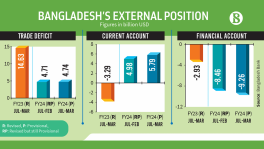Dos and Don'ts
Expert opinion

" Finding the right investor is like finding real love"
-Nazim Farhan Choudhury, Serial entrepreneur, Angel investor, and Managing Director of Adcomm Holdings Limited

"The process of finding the right investor is like finding real love.
Founders should attend the right forums and platforms to figure out where and how they will meet potential investors.
When writing the business plan, make sure your proposal provides investors with relevant information; to the point but thorough.
Your start-up idea needs to be relatable; coming up with a solution to a problem you have faced can best aid in strengthening your business model.
When presenting, remember, your pitch should encompass the potential of your start-up. For that, you need to have a precise understanding of your market.
Investors are keen on how your idea can be monetised and bring a fruitful return on investment. So, put forward your plans of future growth and scalability.
The founding team plays a very important role behind a start-up's success. The core team should be passionate, persistent, and have an edge over its competitors. Also, founders open to ideas, advice and mentorship is just as important.
"Do not go crazy obsessing over it"
-Samad Miraly, Executive Director of Olympic Industries Limited, Founding Board Member of Bangladesh Angels Network, and Co-Founder, UpSkill

A business plan gives clarity to both entrepreneurs and investors. No business has ever gone exactly according to the business plan.
Things change and the world - and business - is dynamic. But having a plan lets you visualise where you want to go - to begin with the end in mind. That lets you work backward with all the steps required to get there.
That said, do not go crazy obsessing over it - because like the world, the plan will change over time. It is also dynamic.
Dos
● DO be realistic.
● DO work backward. Design the end state - what the business is when you have built it.
● DO use milestones and achievement markers.
● DO use numbers.
● DO focus on metrics that matter for measuring the performance of your specific business.
● DO concentrate on what YOU are doing and what YOU are building for your customers.
● DO KNOW YOUR CUSTOMER. BETTER THAN ANYONE ELSE.
DONTs
● DO NOT be over ambitious.
● DO NOT obsess on numbers. A plan is a guide.
● DO NOT look at others' success.
"Customer interviews should not be your friends and family"
M Fayaz Taher, Co-Founder, Startup Dhaka, COO, Bongo, and Co-Founder, UpSkill

Planning, in general, is very important.
A business plan is writing an action plan on a paper, PowerPoint, or notepad in an organised manner that will serve as a guideline for you and your company. It helps to ensure internal and external alignment, as well as helps you structure your thoughts to ensure you have thought about most aspects of the business.
As entrepreneurs, we get very excited about our idea and sometimes, lost in the optimism to see the risks and potential challenges, planning, in general, helps to mitigate the rough waters you may face in your journey."
A business plan is a guideline. As you learn more about your customers, the nature of the industry, and get more data, you need to adjust your plan to ensure the company's success.
This is a big mistake many people make that once they have a fixed plan they do not improve or iterate that plan from the business data they start gathering once they start executing.
Ensure you have evidence to support your plan through primary and secondary research and that there is a market large enough for the business to help you meet the goals you set.
Primary research involves doing customer interviews and secondary research involves reports and industry data available to help you understand the market and consumer behaviour.
When you do your customer interviews do not ask your friends and family.
"Having to teach the founder about the market is a red flag"
-Nirjhor Rahman, CEO, Bangladesh Angels Network (BAN)

"Having a strong plan is quite useful. We want to hear about a company's specific 12-18 month plan in order to validate it based on experience, customer interaction, and learning about the market.
I always see it as a red flag if I am having to teach the founder about the market, I always see it as a positive thing if they are teaching us about the market.
The founding team should have a firm background, knowledge, and experience in their own respective fields.
If your revenue model is not the best one, we definitely want to see momentum; whether you are able to sign up customers, they are continuing to use your product, referring others to do so. It is nice to come across such companies although it is not so easy.
There are certain areas we are really excited about. I have been excited about fin-tech for a very long time but unfortunately, I have not found any company in Bangladesh yet that has been able to progress in fin-tech.
I think education is an exciting field, there is a lot we can do in healthcare and agriculture as well. There are many angels wanting to do something in agriculture but we have not found many promising platforms. Anytime we see someone doing something in such sectors, we look forward to working with such companies.
"Founders are dreamers who often ignore boring but vital things"
-Rajib Das, Co-Founder and Managing Director, Loop Freight

90 percent of start-ups fail for many reasons - not having the right product market fit, discounting competitors, not having the right set of skill sets in the team, not having the right financial budget in advance and so on.
Founders are often dreamers who are so excited about the prospect of their novel ideas that many a times, they ignore certain things that may seem boring from the outset but are vital for the success of the venture.
A business plan forces founders to at least start thinking of all the aspects of the business holistically and consider all these variables in their decision making process.
DOs:
● Plan your budget pessimistically because there will always be hidden expenses.
● Be as detailed as possible so that it forces you in depth rather than just scrap a topic on the surface.
● Certain templates do not have risks and contingencies but it is an extremely important section for a business plan. It helps founders to neutrally asses the risks with their strategies and formulate ideas to counter them if things indeed go wrong, which most certainly will to some extent.
DONTs:
● Plan slowly but adapt fast.
● Business plans are written during the early stages of a company's inception. Almost certainly, there will be times in the business where founders have to strategise on the go and all the plans that seemed perfect on paper will not be applicable any more.
● It is important for founders to plan excruciatingly but not to an extent that they are not flexible to change. Lack of adaptability is one of the biggest reasons start-ups fail in the modern day."


 Keep updated, follow The Business Standard's Google news channel
Keep updated, follow The Business Standard's Google news channel
















